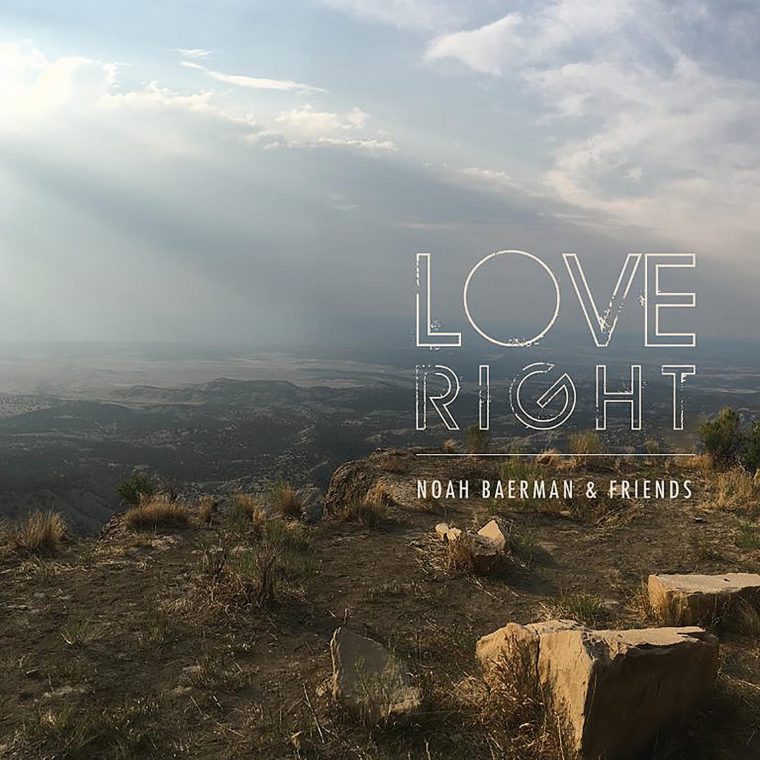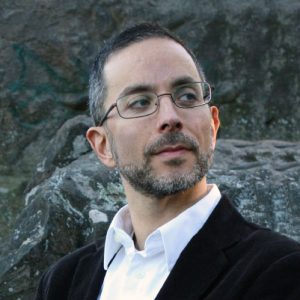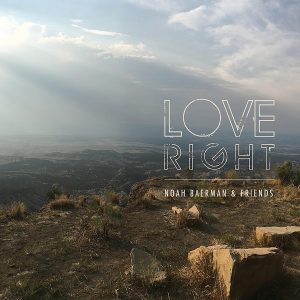Baerman, Wesleyan Community Pay Tribute to Randall ’12 with New Album, Love Right

A new album created by pianist and composer Noah Baerman, director of the Wesleyan University Jazz Ensemble, features more than 80 minutes of performances honoring his friend and former student, vocalist Claire Randall ’12, who was murdered in December 2016.
Love Right, produced by Resonant Motion, Inc. (RMI) Records, showcases songs written by Baerman alongside more than 40 Wesleyan-affiliated instrumentalists and singers who navigate a broad multitude of musical styles. It was released on Oct. 9 and is Baerman’s 11th album.
“Love Right is by far the most stylistically eclectic thing I’ve ever done,” Baerman said. “I’ve incorporated different styles before, but there are songs here that are so radically different in genre that they wouldn’t normally appear on the same album.”
The album’s diverse musical repertoire is the result of having different ensembles of singers and musicians on every track. In fact, 100 performers contributed to the album in the styles of jazz, blues, samba, a cappella, folk, gospel, Afropop, and soul.
Randall, who appeared on Baerman’s Ripples and The Rock and the Redemption albums, was a close friend of Baerman’s and was on the core team that launched RMI. A month following Randall’s death, Baerman awoke from a dream of his former student, hearing the substance of a bluegrass-infused song, “Beautiful and Cruel,” which he completed in less than an hour.
“Many of the songs emerged within the first few months of grieving; that one and the blues song ‘I’m Goin’ Home’ were just necessary forms of emotional expression. Ultimately I’m a jazz musician, though, so I didn’t view them as things I’d likely ever perform or record,” Baerman said.

Baerman later created a trilogy of pieces written just prior to Claire’s memorial service, including “Blueprint,” a manifesto for incorporating Claire’s spirit into one’s life; “Cheese Time,” a rock-soul song telling his personal experience feeling Randall’s presence at a moment of particular struggle; and “Love Right,” a soulful modern jazz composition in the tradition of Wayne Shorter and John Coltrane, with a short a cappella rendering as a prelude for the album.
The songs were accumulated without specific plans for over a year until Baerman received an Artist Fellowship from the Connecticut Office of the Arts to continue to develop this material. In 2018, Love Right was conceived as a larger work, intended to celebrate Randall’s spirit.
Throughout 2019, Baerman worked with musicians from three continents and 12 states who offered their own mixture of musicianship and friendship. This process led to the recording of 17 tracks, including more original compositions, some collaborations, and several arrangements of existing material by others. The album concludes with singer-songwriter Bruce Cockburn’s “Joy Will Find A Way,” featuring a choir, tuned wine glasses, cello, and percussion melding rhythms from Latin America, North and South India, and New Orleans.”
Unlike his usual studio experiences trying to cut an entire jazz album in a single day, Baerman savored each of these connections, musical moments, and thoughts and memories of Randall.
“What was pretty consistently true was a sense of community/connection surrounding the work and I hope that now that it has come to fruition it brings others some healing or nourishment,” Baerman said.
Wesleyan-affiliated musicians on the album, ranging from faculty and staff to students and alumni, include Jess Best, vocals; Matt Bernstein, electric rhythm guitar; Becket Cerny, percussion; Chris Dingman, vibraphone; Matt Forker, electric guitar; Sam Friedman, harmonica; Daphne Gampel, vocalist; Johnnie Gilmore, electric bass; Gabe Gordon, piano; Spencer Hattendorf, alto saxophone; Scott Kessel, percussion; Mel Hsu, vocals and cello; Leah Lucid, vocals; Nate Mondschein, drums; Michelle Paul, vocals; Mariana Quinn-Makwaia, vocals; Claire Randall, vocals; Sarah-Jane Ripa, flute; Garth Taylor, vocals; Andy Werle, electric guitar; Zoe Zeeman, electric bass; Bill Carbone, drums; Sam Dickey, guitar; Jasmine Lovell-Smith, soprano saxophone; Tyshawn Sorey, drums; Rani Arbo, vocals and fiddle; Jay Hoggard, marimba; Jared Paul, sound engineer; Shona Kerr, bassoon; Allison Lazur, tuba; David Nelson, mridangam; Nadya Potemkina, viola; Kate Ten Eyck, euphonium; Marvin McNeill, tambourine; Jocelyn Pleasant, percussion; former Wesleyan staff member Persephone Hall, vocals; and former Wesleyan faculty Gina Ulysse, vocals. Also, Center for Creative Youth alumni Anne Boccato, percussion; Erica Bryan, vocals; Sean Clapis, electric guitar; Kwawu Darko, organ; Atticus Kelly, organ; Rebecca Koval, vocals; Pete LaMalfa, electric piano; and Marcos Torres, III, percussion.
The 17-track album is available for online streaming free of charge, or can be purchased online for $10. For $20, buyers will receive a limited-edition accordion-fold booklet with notes, credits, and a musician collage created by Kate Ten Eyck, adjunct assistant professor of art. John Elmore, Center for the Arts art director, was the booklet’s production coordinator.
All proceeds benefit Claire’s Continuum, a program founded by Baerman and Claire’s partner Gabe Gordon ’11 that honors her activism and community-building by commissioning first-time artistic collaborations to create socially conscious work.
“As much as I would have loved for this to be a heroic narrative that ends in triumphant healing, it wound up being a reflection of my own inner reality, which is more complicated,” Baerman said. “My soul was crying to express these varied and complicated emotions and I chose to obey it and follow that to its logical conclusion. To an extent, I feel that being faithful to those kinds of impulses is central to what being an artist is. And when I listen to this I cry, so I guess there’s something potent in there that hopefully also translates to others, whether those who loved Claire, those who admired her from a distance, or those who can simply relate to unexpected and unfair loss and the less-often-discussed thoughts and emotions that come along with it.”


